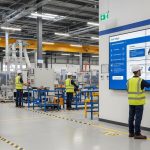In a world that’s increasingly becoming digitized, UK companies are leveraging technology to optimize their human resources management. How, you ask? The answer lies in artificial intelligence (AI). AI is no longer the stuff of science fiction; it’s a practical tool providing real-world solutions for businesses. This potentially transformative technology is helping streamline operations, glean insights, and enhance employee performance. But how exactly does this work? This article will explore just that.
Harnessing AI for Better Data Management
One of the core functionalities of human resources (HR) revolves around data management. HR managers grapple with colossal mounds of data concerning various aspects of employee information, from recruitment and retention metrics to performance evaluations and payroll.
Also to discover : How Can UK Construction Firms Implement Sustainable Building Materials?
Enter AI. AI possesses the ability to process and analyze this data efficiently and accurately, granting HR managers valuable time that can be redirected towards strategic decision-making. For instance, predictive analytics, a facet of AI, can process past data to forecast future trends. This could help predict employee turnover, enabling proactive measures to enhance retention.
AI-powered HR management systems also ensure better data security, significantly reducing the risk of data breaches.
In parallel : How do integrated safety systems digital signage enhance workplace compliance and safety?
Improving Employee Performance with AI
Another significant advantage of introducing AI into HR management is its potential to boost employee performance. AI can assist with performance management by continuously tracking and analyzing an employee’s productivity, engagement levels, and work patterns.
By providing real-time feedback, AI not only helps employees understand where they stand but also identifies areas for improvement. This ongoing feedback mechanism can facilitate a more agile and responsive performance management system, leading to a highly motivated and productive workforce.
AI-based training platforms can also offer personalized learning experiences, adapting to an employee’s pace and learning style. This not only makes training more engaging but also ensures more efficient learning, thereby contributing to improved performance.
Streamlining Recruitment and Talent Management
In the realm of recruitment and talent management, AI is a game-changer. It can significantly streamline the recruitment process, saving HR managers countless hours spend on resume screening and shortlisting candidates.
AI tools can scan hundreds of resumes in a fraction of the time it would take a human, identifying potential matches based on predetermined criteria. Moreover, these tools can eliminate unconscious bias, ensuring a fair and objective selection process.
In terms of talent management, AI can provide insights into an employee’s skills, strengths, and areas of improvement. These insights can guide HR managers in assigning roles that best leverage an employee’s talents, leading to increased job satisfaction and productivity.
Enhancing Workforce Planning with AI
Workforce planning, a critical aspect of HR management, can be significantly enhanced with AI. AI-powered forecasting tools can analyze historical trends and present data to predict future workforce needs.
These tools can help HR managers plan for seasonal fluctuations, project-based staffing needs, and long-term strategic goals. For instance, if data indicates a higher employee turnover rate during a specific period, HR managers can plan ahead to ensure the workforce is adequately staffed.
Implementing AI in workforce planning also helps in identifying skill gaps within the organization. With such insights, companies can focus on targeted training and development programs to bridge these gaps.
AI and Workplace Culture
Finally, AI is not just about numbers and data; it also plays a pivotal role in shaping the workplace culture. AI-powered chatbots and virtual assistants can provide employees with instant responses to their queries, enhancing their experience at the workplace.
AI can also support HR managers in developing and maintaining an inclusive workplace culture. By tracking and analyzing communication patterns, AI can identify instances of bias or discrimination. This allows HR managers to address these issues promptly, fostering a culture of fairness and respect.
In conclusion, AI holds immense potential in optimizing human resources management. From data management and performance enhancement to recruitment and workforce planning, AI is proving to be a valuable ally for HR managers. The integration of AI in HR processes not only drives efficiency but also contributes to a more engaged and motivated workforce. Despite the challenges, the benefits of AI in HR management are too significant to overlook.
Leveraging AI for Decision Making and Employee Engagement
Decision making is a critical aspect of human resources management. HR managers often need to make crucial decisions concerning recruitment, performance management, talent acquisition, and workforce planning. However, making these decisions can be challenging due to the complexities involved and the vast amount of data that needs to be considered.
Artificial intelligence can be a powerful ally in this regard. AI-based systems can analyze extensive data sets, draw meaningful insights, and present them in an easy-to-understand format. These insights can guide HR managers in making informed decisions. For instance, Google Scholar is a machine learning tool that can analyze employee profiling data and recommend the most suitable candidates for a particular role. This data-driven approach reduces guesswork and enhances the effectiveness of decision-making.
Artificial intelligence can also play a significant role in boosting employee engagement. AI-powered platforms can curate personalized experiences for employees, taking their preferences and work styles into account. For instance, AI chatbots can provide instant responses to employee queries, facilitating seamless human interaction and thereby enhancing the overall employee experience.
AI can also analyze employee feedback and sentiment, providing insights into their engagement levels and job satisfaction. This people analytics approach enables HR managers to devise strategies aimed at enhancing employee engagement, thereby promoting a positive workplace culture and boosting productivity.
AI in Talent Management and Future Work Trends
In the realm of talent management, AI can be a formidable asset. From scanning resumes to identifying talent gaps, AI systems can provide valuable support to HR managers. AI tools can analyze vast amounts of data and identify patterns that might be overlooked by humans. This can help HR managers develop effective strategies for talent acquisition and retention.
For instance, machine learning algorithms can analyze employee performance data and identify those with the potential for growth. This can help HR managers nurture high-performing employees and prepare them for leadership roles, thereby optimising the organisation’s human capital.
AI can also provide insights into future work trends. By analyzing industry data and market trends, AI systems can predict upcoming changes in the job market, enabling companies to adapt their human resources strategies accordingly. This forward-looking approach can give companies a competitive edge and ensure their survival in an ever-evolving business landscape.
In the rapidly digitizing world, the use of artificial intelligence in human resources management is no longer a luxury but a necessity. AI brings numerous benefits, from optimizing data management and enhancing employee performance, to facilitating informed decision making and fostering a positive workplace culture. Despite the challenges, the potential of AI for HR management is enormous and cannot be overlooked.
Adopting a data-driven approach and incorporating AI into HR processes can significantly enhance efficiency and productivity. It can also promote a culture of continuous learning and improvement, leading to a highly engaged and motivated workforce. As we look ahead, it’s clear that AI will continue to play a pivotal role in shaping the future of human resources management in the UK and beyond.






